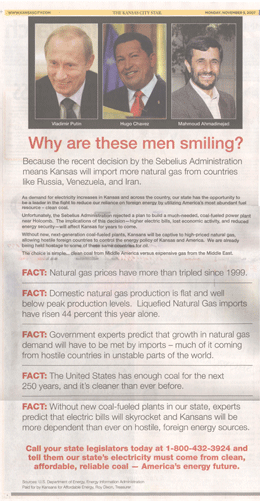Based on this morning’s
listing,
as Step It Up 2 gets underway:
HOUSE
Leadership
- Nancy Pelosi (Cal.), Speaker of the House
- Chris Van Hollen (Md.), DCCC Chair
Not participating: Hoyer, Clyburn, Emanuel, Larson, and the Republican
leadership
Energy Independence and Global Warming
- Ed Markey (Mass.), chairman
- Earl Blumenauer
- Jay Inslee
- Jerry McNerney
Not participating: Larson, Solis, Herseth Sandlin, Cleaver, Hall, and
every Republican
Energy and Commerce
- Tom Allen (Maine)
- Lois Capps (Cal.)
- Charles Gonzalez (Tex.)
- Baron Hill (Ind.)
- Jay Inslee (Wash.)
- Ed Markey (Mass.), chairman of Global Warming Committee
- George Radanovich (R-Cal.)
- Henry Waxman (Cal.), chair of Oversight and Government Reform
Committee
- Anthony Weiner (NY)
Not participating: Baldwin, Barrow, Boucher, Butterfield, DeGette,
Dingell (chair), Doyle, Engel, Eshoo, Gordon, Green, Harman, Hooley,
Matheson, Melancon, Ross, Rush, Schakowsky, Solis, Stupak, Towns, Wynn,
and all Republicans except Radanovich
Agriculture
- Mike McIntyre (NC)
- Brad Ellsworth (Ind.)
- Kirsten Gillibrand (NY)
- Steve Kagen (Wis.)
- Nick Lampson (Tex.)
- Joe Donnelly (Ind.)
Not participating: Baca, Barrow, Boswell, Boyda, Cardoza, Costa,
Cuellar, Lincoln Davis, Etheridge, Herseth Sandlin, Holden, Tim Mahoney,
Marshall, Peterson (chair), Pomeroy, Salazar, Scott, Space, Walz, every
Republican
People in italics are sending a representative or a statement of
support to a Step It Up event.

